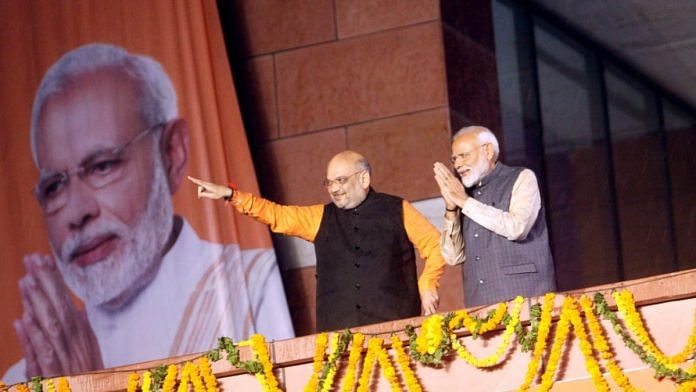Reassurance that isn’t
Apoorvanand |The writer teaches Hindi at Delhi University
Indian Express
Apoorvanand is disturbed by The Indian Express’s use of the word “magnanimous” to describe the prime minister’s speech on earning the trust of minorities in an editorial dated 27 May. He writes the word is “hurtful and cruel” because it implies inclusion of minorities is an act of generosity, which Apoorvanand says it isn’t: “It pertains to the rights that flow from the Constitution — not the intent of the rulers”.
Apoorvanand holds the prime minister responsible for the “persecution” of minorities, and Muslims in particular — “It was not only his silence on hate crimes” that led to this state “but his incitement for Hindu mobilisation” too. It is Modi — a “repeat offender” of Mahatma Gandhi’s principle that Muslims are not the vassals of Hindus — who needs to be held accountable for the actions of his “unruly followers”. He is their guiding light, and a “master of the art of deception”. What is left to do now, concludes Apoorvanand, is to call people “by their names” instead of “clothing them” in our wishes.
Lessons from and for the republic
Valson Thampu | Indian educator, Christian theologian, who was the principal of St Stephen’s College
The Telegraph
Thampu says the Congress performed poorly “as expected” and the outcome speaks more of the Opposition’s “political infantility” than Modi’s invincibility. Thampu likens the electorate to the spectators in Plato’s allegory, the cave. Modi, like a puppeteer, is a “past master in the art of generating images and hypnotic illusions”, one that neither Rahul Gandhi nor the Opposition effectively called out. Thampu calls Rahul Gandhi India’s most “improved leader”, whose message to expose Modi was “lost”. “It is erroneous to read the electoral result as a Modi-wave”, argues Thampu, “It is, rather, the high tide of magical illusions”, one that will persist as long as “masses remain uncritical consumers.” The Constitution demands that magic be countered by the logic, which can be provided by a “liberal education”, writes Thampu.
Reducing suicide deaths: a collective responsibility
Soumya Swaminathan | Chief scientist, World Health Organisation, Geneva
Hindustan Times
Swaminathan writes even though India is “poised” to be a global leader, it is “equally important” to ensure everyone has the “opportunity” to contribute to India’s growth and lead a “good quality life”. The “stark” reality, however, is that we have the highest number of suicide deaths, globally. If this trend continues, she warns, “the probability of India achieving the Sustainable Development Goals (SDG) suicide death rate reduction target in 2030 is zero”. The first step is to record the deaths “accurately” so the depth of the issue is properly gauged. Young people deserve “interventions” like counselling that will make them “resilient” and not “shy” about addressing mental health. All of this will require cooperation from the police, NGOs and peer support groups. She argues it is “collective responsibility” to end “these tragic and preventable deaths.”
Why the integrity of data matters
A. Vaidyanathan | Economist and a former member of Planning Commission and RBI board
The Hindu
That the National Sample Survey Office (NSSO) will now come under the Central Statistics Office (CSO) is a cause for “surprise and concern”. Traditionally, NSSO surveys have commanded “wide respect” for their “professionalism, independence and integrity.” “Widespread apprehensions” over the merger should be “allayed promptly in an unqualified manner” — subjecting the survey’s findings to any department before publishing “will hugely dent the credibility of the Indian statistical system.”
Of course, the NSSO survey is far from perfect: the merger “can help by providing funds for specialised research on survey design and methodology”, but will not improve any lapses on the part of respondents. The survey, writes Vaidyanathan, deserves “greater attention and resources” than what it receives at present.
Greater transparency could enhance RBI credibility
Vidya Mahambare | Professor of economics, Great Lakes Institute of Management, and Anuj Agarwal, Mumbai-based economist
Mint
The authors, addressing the RBI and state, say that transparency is the key for the credibility of any central bank – therefore releasing the transcripts of the meetings or having silent observers present at these meetings is desirable.
At present, RBI publishes the minutes of the central bank meeting, but does not convey how the deliberations were carried out. The overall assessment of the economy is followed by the statements of members followed by voting. However, the voting order is not known. The authors argue “it is unclear how far the exchange of information and deliberations among members influences their individual decisions”. The writers push for sharing the decision-making process in the public domain.
A demographic demon?
Anjana Menon | CEO Content Pixies
Economic Times
Menon writes the Narendra Modi government’s biggest challenge will be to create enough jobs for the millennials who voted him to power. She writes creating one million jobs every month is a ‘breathless task’ for any government. She says India is unprepared for a shift towards highly skilled labor force and a sound, flexible labour market — Make in India, Startup India and Skilling India won’t count for much if it is not accompanied by ‘Re-educate and Recalibrate India’. She adds India’s youth deserves schooling that gives them a fair short at employability.
It’s about high quality jobs
Naushad Forbes | Co-chairman of Forbes Marshall
Business Standard
Forbes writes on why high-quality jobs are important and how tourism is the important services sector that can add to a “jobs boom” in manufacturing. He says tourism is India’s greatest untapped opportunity as no country has the combination of India’s architectural diversity, natural beauty and rich cultural diversity. He questions why India lags in the world tourism rankings despite such attributes. He bats for a ‘tourism czar’ who has powers to work across ministries and state governments to attract tourists. He also pushes for labour reforms to unleash labour-intensive manufacturing and policies to promote garments, footwear and food processing.



